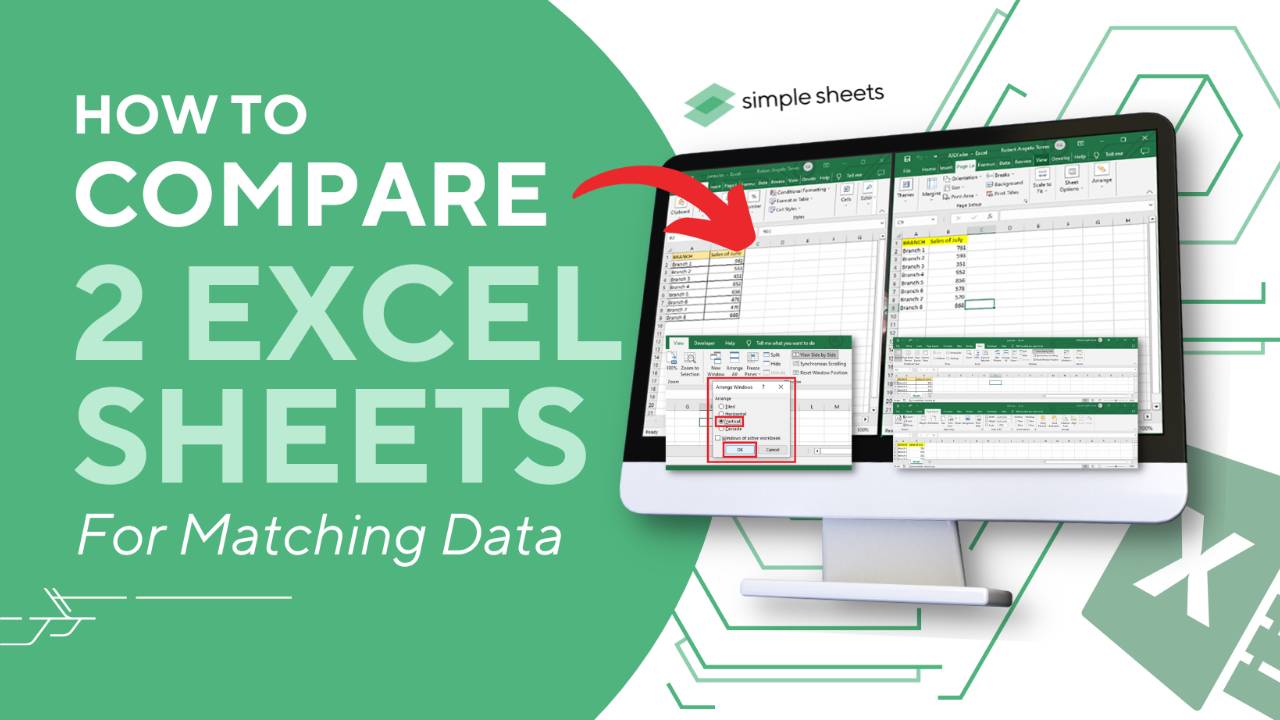5 Simple Steps to Compare Excel Sheets Automatically

Are you tired of manually comparing changes between different versions of an Excel sheet? Automating this process can save you significant time and ensure accuracy in tracking modifications. Here, we guide you through five simple steps to compare Excel sheets automatically, making your workflow more efficient and error-free.
Step 1: Set Up Your Excel Sheets

Before diving into comparison, it’s crucial to prepare your Excel files correctly:
- Ensure Compatibility: Use the same version of Excel to avoid compatibility issues. This ensures that features and formulas work consistently across documents.
- Data Consistency: Keep your data formats uniform, like dates, times, and number formats.
- Backup Original Sheets: Always have a backup of your original documents. This protects against accidental data loss.

Step 2: Use Excel’s Inbuilt Compare Tool

Excel offers an inbuilt comparison tool that can be quite handy:
- Open the first Excel sheet you wish to compare.
- Go to the ‘Review’ tab, then click on ‘Compare and Merge Workbooks’ in the ‘Changes’ group.
- Select the second Excel sheet when prompted.
- Excel will now show differences in a new workbook, highlighting changes:
- Added or modified cells are in blue.
- Deleted cells are highlighted with comments.
⚠️ Note: The 'Compare and Merge Workbooks' feature works only if the 'Track Changes' option was enabled on both sheets prior to making changes.
Step 3: Use Excel Formulas for Detailed Comparison

If the inbuilt tool isn’t detailed enough, you can use Excel formulas to compare data:
| Formula | Description |
|---|---|
| =IF(A1=‘Sheet2’!A1, “Match”, “Differ”) | Checks if cell A1 from Sheet1 matches cell A1 from Sheet2. |
| =COUNTIF(Sheet2!A:A, A1) | Counts the number of times the value in Sheet1’s cell A1 appears in Sheet2. |

These formulas allow for a customized comparison:
- Row by Row Comparison: Use the IF formula to check each cell one by one.
- Entire Column or Row Check: Use COUNTIF for a quick overview.
⚠️ Note: When comparing entire columns or rows, be aware that this can slow down Excel for large datasets. Use with caution.
Step 4: Implement VBA for Advanced Comparison

For more complex comparisons, you might turn to VBA (Visual Basic for Applications):
- Automation: VBA can automate comparisons across multiple sheets or even workbooks.
- Customization: Write scripts to check specific criteria, like changes in formula values or date updates.
- Visual Feedback: Create macros that highlight differences visually, like color-coding cells.
Here’s a basic example of a VBA script for comparing two sheets:
Sub CompareSheets() Dim ws1 As Worksheet Dim ws2 As Worksheet Dim cell As RangeSet ws1 = Worksheets("Sheet1") Set ws2 = Worksheets("Sheet2") For Each cell In ws1.UsedRange If cell.Value <> ws2.Range(cell.Address).Value Then cell.Interior.Color = RGB(255, 0, 0) ' Highlight differences in red Else cell.Interior.Color = RGB(0, 255, 0) ' Highlight matches in green End If Next cell
End Sub
Step 5: Utilize Third-Party Tools

When Excel’s native capabilities fall short, third-party tools can step in:
- Tools like Beyond Compare or DiffDog: Offer advanced comparison options, including visual diffs for spreadsheets.
- Excel Compare: A free tool that can compare spreadsheets on different criteria with a user-friendly interface.
- Online Services: Websites like ExcelCompare or Spreadsheet Compare allow file uploads for comparison without needing software installation.
These tools are particularly useful if:
- You need to compare multiple workbooks at once.
- You require detailed change logs or reports.
- Excel’s performance is impacted by large data sets.
💡 Note: Ensure any third-party tool you use complies with your organization's security and privacy policies.
Following these five steps to compare Excel sheets automatically not only streamlines your work but also helps maintain accuracy in your data management. From utilizing Excel's built-in features to exploring VBA and third-party tools, you're now equipped to handle even the most intricate comparison tasks with ease. Remember to set up your sheets properly, consider formulas or VBA scripts for tailored comparisons, and leverage external tools for more complex scenarios.
What are the limitations of using Excel’s built-in compare tool?

+
The Excel inbuilt compare tool requires ‘Track Changes’ to be active prior to any modifications, which might not always be practical. Also, it only highlights differences without providing a comprehensive report.
Can I compare more than two Excel sheets at a time?

+
Yes, but Excel’s native tools don’t support this. You would need to use VBA scripts or third-party tools to compare multiple sheets efficiently.
How can I ensure the comparison process does not slow down Excel?

+
For large datasets, avoid formulas that compare entire columns or rows, as they can significantly slow down Excel. Consider breaking your data into smaller chunks or using third-party tools designed for large-scale comparisons.
Are there any privacy concerns with using third-party tools?

+
Yes, uploading sensitive data to online tools can pose privacy risks. Always check the privacy policy and data handling practices of the tool or service you choose. For sensitive data, consider using locally installed software or ensure that the tool complies with your company’s security protocols.